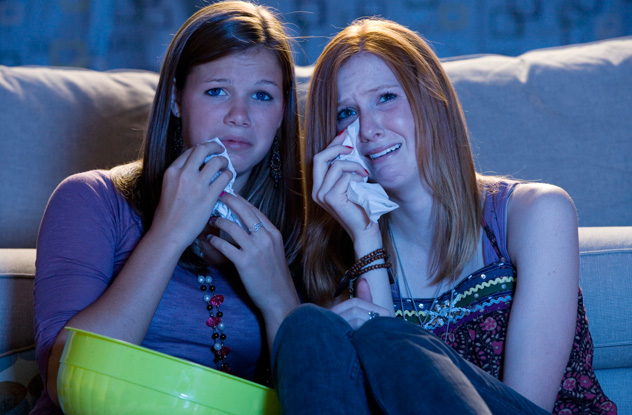(单词翻译:单击)
5.Crying
5.哭泣
Crying seems like an ordinary enough experience and something we don't really think of as strange. Yet if we really stop to contemplate what's happening—salt water dripping out of our eyes during emotional moments—it seems a little bizarre. What do tears, eyes, and emotions have to do with each other?
哭泣似乎是一件相当普通的事,我们真的不觉得这会是奇怪的行为。不过让我们停下来仔细想想——情绪激动的时候就会流泪,这似乎就有点儿奇怪了。那么,眼泪、眼睛以及情绪之间究竟有着怎样的联系呢?

One of the prevailing theories to explain human crying is put forth by Dutch psychologist Ad Vingerhoets. He argues that crying is largely a social sign that has its evolutionary roots in distress signals. Most young animals emit some type of distress sound to alert others that they need help. It's thought that crying started as a way for humans to signify their distress (through tears) without making a predator-alerting scream or other noise. Although human babies usually have audible cries, adults often shed tears with little noise. Evolutionarily, this could have been an advantageous response, since another member of the tribe would only need to glance at the crier to see he was in trouble. Interestingly, humans are the only species to emit emotional tears. Most other animals stop making distress calls after reaching adulthood.Further evidence that crying may have originated as a response to danger or trouble is that it also works in conjunction with our sympathetic nervous system (or the fight or flight system). For example, in addition to shedding tears, crying speeds up the heart rate, increases sweating, and slows breathing. Emotional tears even contain a natural painkiller, leucine enkephalin, which could partially explain why we sometimes feel better after a good cry.So, although we can nowadays cry when alone or during harmless, sappy movies, the act may have started as a method of protection.
目前较为普遍的理论是荷兰心理学家艾德·威格尔兹提出的关于哭泣的解释。他认为哭泣是从求救信号进化而成的社交信号。大多数幼小的动物都会在需要帮助的时候发出某种求救的声音。而对于人类来说,哭泣最开始只是一种表达痛苦的方式,只是流泪,而非尖叫或发出其他巨大声响。虽然人类在婴儿时期都是大声啼哭,但成年后反而只是低声抽泣了。从进化论的角度来看,这样的反应其实更具优势(因为艾德·威格尔兹认为,大多数动物成长后,将不再需要释放悲痛的信号,这可能是因为怕引来更大的危险。而比起发出巨大声响来说,哭泣反而没有那么危险)。对于亲近的人来说,一滴眼泪足以让他们知道你处于痛苦中。有趣的是,只有人类会因情绪上的原因流泪,也只有人类成年后还会流泪,其他大多数动物成年后就不再发出呼救信号了。进一步的证据表明哭泣可能是源于对危险和困难的反应,并且它还与我们的交感神经系统相关。比方说除了流泪之外,哭泣还会使心率加速、出汗增加以及呼吸减缓。情绪激动时的流泪甚至可以说是亮氨酸脑啡肽——一味天然的止痛药,这就是为什么有时候我们在哭过后反而感觉更好。这样看来,虽然我们是因为孤独或是看了悲情的电影感到难过而哭泣,但这同样也是一种自我保护的方式。
4.Twitch When Falling Asleep
4.熟睡的时候抽搐

As much as 70 percent of people twitch or have an involuntary jerk, or hypnagogic jerk, when falling asleep. Other than amusing awake onlookers, it seems there must be an explanation for a behavior that's apparently so common. Unfortunately, scientists aren't entirely sure why we have the spasms, but of course, there are some educated hypotheses.
高达70%的人入睡时都会不由自主的抽搐或者痉挛。除了娱乐清醒的旁观者外,似乎一定有一个原因来解释为何这一症状出现得如此频繁。不幸的是,现在科学家们尚不能完全确定我们肌肉痉挛的原因。但当然,他们也有一些科学的猜测。
Some scientists believe it's nothing more than an accidental reaction that happens when our nerves misfire while transitioning from alertness to sleep. This is because our bodies don't have a definitive on/off switch, where "on" is awake and "off" is asleep. Instead we gradually transition between the state where our reticular activating system (which governs basic physiological processes) is in full force and when the ventrolateral system (which drives sleepiness and influences sleep cycles) is in charge. We can be in the middle of the two states, such as when feeling sleepy, and there can be a bit of a struggle as we firmly position ourselves into one state or another. This back-and-forth struggle is thought to cause the misfiring, and the twitches are the last fights of wakefulness.In contrast, others believe it's an evolutionary response left over from our tree-dwelling days, and the jerks are a primate reflex that keeps us from getting too relaxed and falling from branches. Other types of spasms while sleeping aren't quite the same as a hypnagogic jerk. Dreaming of falling, for instance, and then jerking oneself awake is more of an example of dream incorporation where the brain intermixes real life and the dream state.
一些科学家认为痉挛只不过是我们的身体在由清醒到熟睡的过渡中,神经元失败地传达睡觉信息时做出的偶然反应。这是因为我们的身体并没有一个明确的开关来控制我们是否清醒还是熟睡。相反,在逐渐完成在网状激活系统(控制基本生理过程)充分发挥作用时和腹外侧的系统(驱动嗜睡和影响睡眠周期)全权负责时的过渡,并且从一种状态转换到另一种状态的过程中,我们的思维一定是挣扎的。而这种反复的挣扎恰好被认为是神经元失败传达信息的原因,抽搐也被当做是觉醒前最后的挣扎。相反,另一些科学家认为抽搐是我们从灵长动物时期遗留下的进化反应,并觉得痉挛是灵长动物的反射,这可以避免让它们因为太放松而从树上跌落。我们熟睡时的肌肉痉挛与入睡抽动并不是完全一样。比如,梦见自己往下跌落时,因抽搐而从梦中醒来则是我们的大脑混淆了梦与现实最好例子。
3.Gossiping
3.八卦

Women usually get pegged as the biggest gossips out of the two sexes, but men are guilty of this social offense as well. At least one study says men gossip 32 percent more than women per day. No matter which sex has the biggest blabbermouths, hurtful gossip can come back to bite us, yet it seems we can't help ourselves when it comes to dishing a little dirt.
女性通常是被认为两性之间最爱八卦的人,但男性同样需要对这种社会冒犯承担责任。至少有一项调查的结果显示,男性每天比女性多八卦32%。不管哪种性别的人最擅长于嚼舌根,但这些伤人的八卦总能使人伤心。而且,这些八卦对我们自己来说也没有任何益处。
The reason for this is that most of us have an inherent desire to bond with those immediately around us—an urge that can overpower any moral obligations we might feel to mind our own business. We want to form social connections to people in our vicinity, and gossiping not only gives us something to talk about, it immediately creates a sense of trust, since the act of gossiping signals that we're letting the other person in our confidence. In turn, the other person shares secrets, and a rapport is established. As we all know, it also gives us a feeling of superiority, is good for a laugh, and spices up boring situations. Curiously, gossiping about people's successes (if there is such a thing) doesn't have the same effect. Studies show that connecting over shared dislikes creates stronger bonds than discussing shared positives.Although gossiping means we're throwing someone else under the bus for the sake of an immediate relationship or gratification, it might not be an entirely bad thing. Anthropologist Robin Dunbar says that gossip partly drove the evolutionary development of our brains. He argues that language first developed out of our desire to share gossip, and it enables us to talk about those who aren't present while indirectly teaching others how to properly relate to the group.About 60 percent of conversations between adults are about someone who's not present. Thus, there's no need to be paranoid that your friends are talking about you when you're not around, as it's almost certainly a fact.
八卦源于我们大多数人都有与周围的人建立联系的内在渴望——一种迫使我们去在意有关的自身道德义务的冲动。我们都希望与身边人建立起良好的社会关系,闲聊不仅能给我们的谈话带来一定的谈资,它还能立即创造一种信任感。八卦一旦开始,这就意味着我们之间存在相互的信任。奇怪的是,八卦别人的成功(如果那个人的确成功的话)却没有同样的影响。研究表明,共同讨论不喜欢的事物比讨论喜欢的事物更容易增进人与人之间的关系。虽然八卦意味着为了促进关系和暂时的快乐而对某个人落井下石,但它也不完全是一件坏事。人类学家罗宾·邓巴表示,八卦对我们大脑的进化发展起到了一定的促进作用。他提出语言最开始的发展源于人类分享八卦的渴望,这种渴望使我们去八卦那些不在场的人。大约60%的成年人之间的对话是关于某人不在场的八卦。因此,没有必要偏执的认为你的朋友趁你不在的时候疯狂的八卦你,这几乎是一个肯定的事实了。
2.Liking Sad Movies
2.喜欢悲情电影

Enough grief, misfortune, and other nonsense happens to us on a daily basis that it seems ridiculous that we would want to spend our entertainment hours subjecting ourselves to more sadness. Despite this, we still regularly find ourselves sitting down to watch a guaranteed tearjerker. While it may seem counterintuitive, one reason for this is that watching tragedies actually makes us feel happier in the short term and therefore boosts our enjoyment of the movie. Researchers at Ohio State University found that watching sad movies causes people to think about their own close relationships, which makes them feel appreciative and satisfied with their lives. Seeing tragedies on the screen causes folks to examine their own lives and count their blessings. However, the researchers point out that this reaction is not the same as those who watch a tragic movie and think something along the lines of, "Sheesh, at least I don't have it as bad as that guy." Those viewers have selfish thinking, are more focused on themselves instead of others, and don't experience any boost in happiness after watching the film.
在日常生活中,悲伤、失意或一些无厘头的烦心事时有发生,如果在闲暇之余还要寻求更多伤感就显得有些可笑了。但人们还是会经常坐下来去看一些保证催人泪下的影视作品。虽然这看起来有点违反直觉,但看悲情电影会使人得到暂时的放松从而更多的去关注电影的剧情。俄亥俄州立大学的研究人员发现,看悲情电影会引人深省,感恩生活,知足常乐。银屏里上演的悲剧让人们评估自己的生活状况,细数人生际遇。然而,研究人员又指出,这种反应并不适用于那些思想狭隘的观众,这些人在看到悲惨剧情时总想着:"切,反正我又不会那么倒霉"。他们总以自我为中心,只关注自己不关心他人,所以看电影对他们来说也不会起到任何怡情作用。
Also, according to Dr. Paul Zak, seeing movies or hearing stories about others causes us to feel empathy and prompts our brains to release oxytocin, which increases our feelings of caring. Zak even refers to oxytocin as the "moral molecule" because of how it makes us more trustworthy, generous, and compassionate. Right after a sad movie and the ensuing rush of oxytocin, we feel more connected to the people around us and overall more satisfied—even if we are shedding some tears. This feeling keeps us coming back for even more depressing flicks.
同时,保罗·塞克博士研究发现,看电影或是听他人的故事会对人起到移情作用,并会促使人体释放催产素。他还提出催产素作为"道德分子",可以提升人的信任感、慷慨度以及同情心。看完悲情电影释放荷尔蒙之后,人们会感觉与身边人的关系更近了,自身整体上更满足了——即使流了一些眼泪。这种感觉也会促使人们看更多的悲情电影。
1.Thinking Silence Is Awkward
1.把沉默当做尴尬

Regardless of whether there is anything of value to say, many of us feel a burning desire to fill every silent moment with some type of conversation. What's so bad about just sitting quietly with someone, and why does prolonged silence make us feel so awkward?
大多数人都会急切地用各种话题来填补每一个沉默瞬间,不管这个话题有没有谈论的价值。和某人安静的坐在一起一言不发到底有什么不好呢?为什么长时间保持沉默会让人感到尴尬呢?
Like many of our behaviors, it all comes down to our primal desire to belong and fit in with the group. According to psychologist Namkje Koudenburg, when the dance of conversation doesn't follow the traditional ebb and flow, we start to worry that something might not be right. We may wonder if we're uninteresting or not relevant, which makes us worry about our position in the group. On the other hand, when the dialogue is bouncing back and forth as expected, we feel socially validated.That said, not all cultures experience awkward silence in the same ways as Americans and others. For example, in Japan, a long pause can be a sign of respect, especially when considering a serious question. Cross-culture businesspeople are even trained on this etiquette, so they don't assume a silent Japanese colleague is unsatisfied with the negotiation or whatever else the conversation is about.The Finnish, Australian Aboriginals, and those in many Asian countries are also known for long, silent pauses in their talk and don't see them as a sign that the conversation has broken down. Rather, it's not uncommon for people from these countries to think Americans talk too much and dominate conversations. Incidentally, for those of us where nonstop talking is the norm, researchers say it only takes four seconds of silence for things to get awkward.
与我们的很多行为一样,这都是出于人类群体意识的本能反应。据心理学家Namkje Koudenburg研究发现,当交流模式和一般你来我往的情况不同时,我们就开始担心是不是交流过程中出现了什么问题。我们会思考是不是别人对自己所说的话不感兴趣,抑或是自己人微言轻不足以被重视。与之相反,如果交谈顺利,我们就会找到自身的存在感。即便如此,并不是所有文化都和美国文化中的沉默即尴尬一样。在日本,交流过程中出现长时间的停顿会被看成是一种尊重,尤其是在思考某些严肃问题的情况下。跨文化交际的商人甚至会专门学习这种礼仪。所以在他们看来,日本同事的沉默并不意味着对协议不满意,这也不会对交流产生任何影响。芬兰人、澳大利亚土著居民,以及许多亚洲人,他们在交流过程中经常会出现长时间沉默的情况,但那并不意味着话题的结束。这些国家的人也普遍认为美国人在交流过程中非常活跃且一直占据着话语的主动权。顺带一提的是,专家指出对于不喜欢交流过程中出现沉默的人来说,四秒的停顿就足以让谈话变得尴尬了。
审校:喵喵 编辑:listen 来源:前十网


